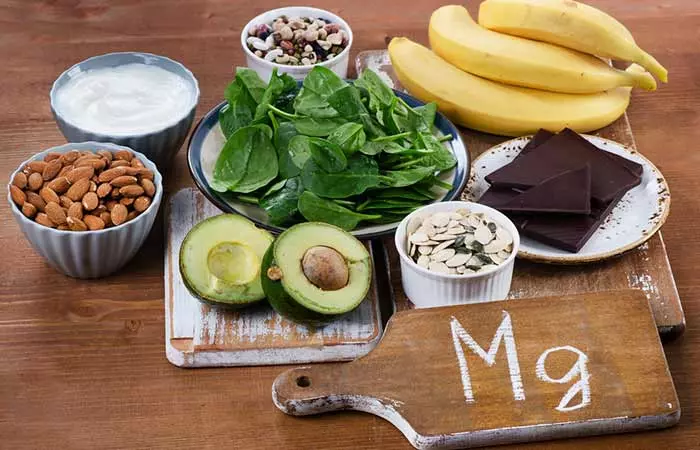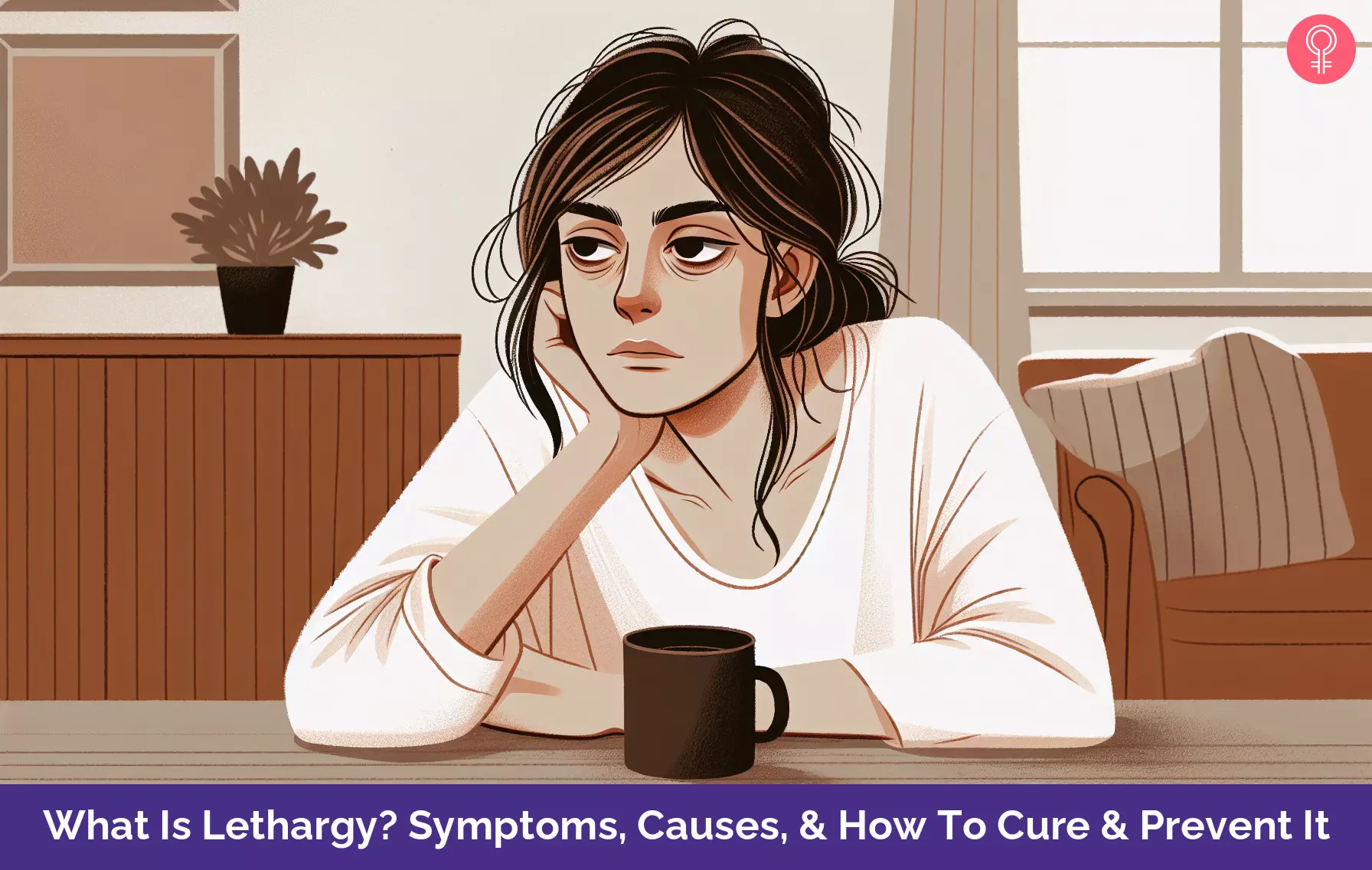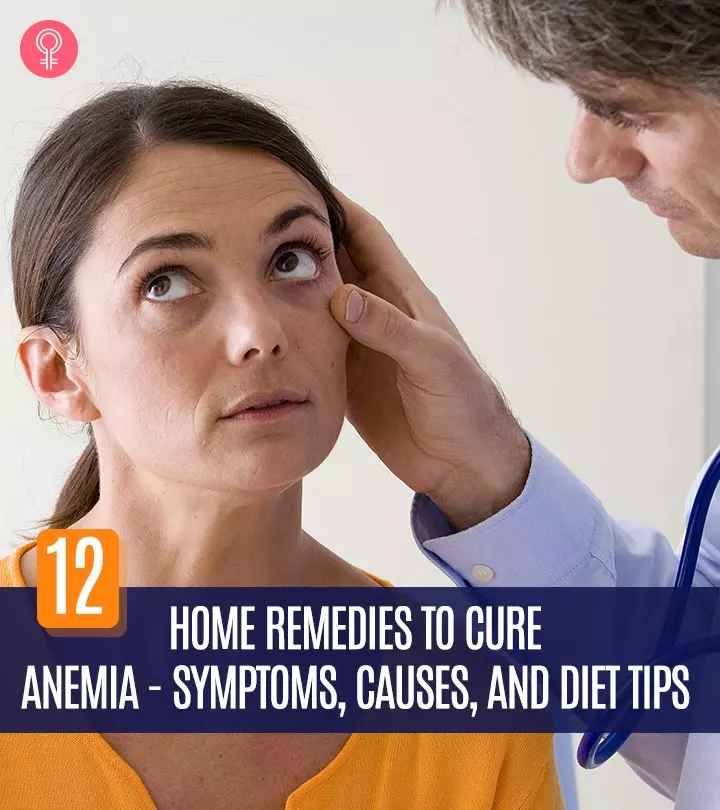What Is Lethargy? Symptoms, Causes, & How To Cure & Prevent It
Laziness can be debilitating – take charge of it to enjoy a more productive and fulfilling life.

Image: Shutterstock
All of us indulge in a lazy day once in a while. But if you find yourself feeling lethargic too often and the feeling of ennui is prominent then it is a cause for concern. Fortunately, there are a few natural remedies to get rid of torpor, laziness and constant feeling of apathy. This article looks at some of the remedies and foods that can treat lethargy naturally and curb the feeling of listlessness and lassitude. You may follow the tips to stay active and energetic. Scroll down to learn more.

In This Article
What Is Lethargy?
Lethargy is a common condition associated with many medical issues, which leaves an individual feeling sleepy and fatigued (both mental and physical). It can include persistent inertia and is commonly characterized by the state of slothfulness and indolence.
It can be identified by the following symptoms.
Key Takeaways
- Mood swings, sluggishness, and low energy are a few symptoms of lethargy.
- Sleep disorders, dehydration, poor diet, and fever are a few causes of lethargy.
- Drinking plenty of water and eating honey may boost your energy levels and combat fatigue.
- Avoiding junk foods, regular exercise, and managing stress help prevent lethargy.
Symptoms Of Lethargy
Individuals suffering from lethargy may experience:
- Mood swings
- Reduced thinking ability
- Fatigue
- Low energy
- Sluggishness
- Drowsiness
- Passivity
- Dullness
- Heaviness
As mentioned earlier, lethargy is a symptom associated with many underlying medical conditions. These may include the following.
What Causes Lethargy?
Health conditions that can leave you feeling lethargic include (1):
- Anemia
- Flu
- Stomach virus
- Carbon monoxide poisoning
- Dehydration
- Hyperthyroidismi A medical condition where the thyroid gland makes too much thyroid hormone and speeds up the body's metabolism.
- Fever
- Hypothyroidismi A medical condition where the thyroid gland produces too little thyroid hormone and slows down the body's metabolism.
- Swelling of the brain (hydrocephalus)
- Lyme diseasei A common disease caused by ticks that, if left untreated, can cause harm to the heart, joints, and the body's nervous system.
- Kidney failure
- Meningitisi A medical condition that causes inflammation of the fluid and membranes surrounding the brain and spinal cord.
- Pituitary diseases like pituitary cancer
- Poor nutrition
- Sleep disorders like sleep apnea
- Traumatic brain injury
- Stroke
Mental health disorders that can result in lethargy include:
- Premenstrual syndrome (PMS)
- Major depression
- Postpartum depressioni A form of depression that occurs after childbirth and includes symptoms like difficulty bonding with the baby and loss of appetite.
Lethargy can also be caused by certain medications such as narcotic drugs.
As discussed, lethargy can occur in babies and children as well. The symptoms that may surface in lethargic infants are:
- Difficulty to be roused
- High fever
- Symptoms of dehydration
- The appearance of sudden rashes
- Vomiting forcefully for more than 12 hours
If you notice any of these symptoms or causes, you could be suffering from lethargy. But irrespective of the causes, certain home remedies can help improve your condition.
How To Cure Lethargy And Laziness Naturally
- Drink Water
- Essential Oils
- Basil Leaf
- Coffee
- Honey
- Lemon
- Green Tea
- Magnesium
- Eat A Healthy Diet
- Reduce Stress Levels
- Get Adequate Sleep
1. Drink Water

Keeping yourself hydrated is one great way to treat and prevent lethargy and laziness. Dehydration can leave you feeling fatigued and tired. Thus, adequate intake of water and other healthy fluids can have a significant impact.
2. Essential Oils
a. Basil Essential Oil

You Will Need
- 2-3 drops of basil oil
- A diffuser
- Water
What You Have To Do
- Fill a diffuser with water.
- Add two to three drops of basil oil to it and mix well.
- Inhale the diffused basil aroma.
How Often You Should Do This
You must do this 1 to 2 times daily.
Why This Works
The stimulating properties of basil oil help boost your concentration, sharpen your senses, and alleviate stress and depression
(2).
b. Peppermint Essential Oil

You Will Need
- 2-3 drops of peppermint oil
- A diffuser
- Water
What You Have To Do
- Add a few drops of peppermint oil to a diffuser filled with water.
- Inhale the diffused aroma.
How Often You Should Do This
You must do this at least twice daily.
Why This Works
Research shows aromatherapy works great in treating weariness and other lethargy symptoms.
Peppermint essential oil works similarly to basil oil in relieving mental fatigue and stress (3).
3. Basil Leaf

You Will Need
- 10 basil leaves
- 1 cup of water
What You Have To Do
- Add the basil leaves to a cup of water.
- Bring it to a boil in a saucepan.
- Simmer for 5 minutes and strain.
- Allow the solution to cool down a bit before drinking it.
How Often You Should Do This
You must drink this twice daily for optimum benefits.
Why This Works
Basil exhibits cognition-enhancing properties in addition to reducing stress, anxiety, and lethargy
(4).
4. Coffee

You Will Need
- 1 tablespoon of coffee powder
- 1 cup of water
- Sugar (as needed)
What You Have To Do
- Add a tablespoon of coffee powder to a cup of water.
- Bring it to a boil and simmer.
- Add a little sugar to the coffee and drink it once it cools down a bit.
How Often You Should Do This
You can drink 1 to 2 cups of coffee daily.
Why This Works
The caffeine in coffee boosts your alertness and energy levels (5).
Caution
Do not drink more than two cups of coffee in a day as it may make you feel tired and sleepy, making you even more lethargic.
5. Honey

You Will Need
A few teaspoons of pure honey
What You Have To Do
Replace the sugar in your favorite dessert or smoothie with a few teaspoons of honey.
How Often You Should Do This
You must consume honey daily.
Why This Works
This natural sweetener may help increase your stamina naturally. The carbohydrates in honey boost your energy levels and help combat lethargy. In fact, honey is also a recommended source of carbohydrates for athletes during endurance exercises (6).
6. Lemon

You Will Need
- ½ lemon
- 1 glass of warm water
- Honey (as required)
What You Have To Do
- Squeeze out the juice of half a lemon into a glass of water.
- Mix well and add some honey to it.
- Drink the lemon water.
How Often You Should Do This
You must do this once every morning, preferably on an empty stomach.
Why This Works
The citric acid in lemon juice can help treat exhaustion by fighting oxidative stress. Regular intake of vitamin C (which lemon juice is rich in) also enhances iron absorption, thereby alleviating the fatigue and stress associated with lethargy (7), (8).
7. Green Tea

You Will Need
- 1 teaspoon of green tea
- 1 cup of water
- Honey
What You Have To Do
- Add a teaspoon of green tea to a cup of water.
- Bring it to a boil in a saucepan.
- Simmer and strain.
- Allow the tea to cool. Drink it up.
- You can also add some honey for taste.
How Often You Should Do This
Drink green tea twice daily.
Why This Works
The antioxidant polyphenols in green tea can relax your mood and relieve the stress and tension that cause lethargy (9).
Note: Having too much green tea can leave you feeling tired and sleepy. So, keep a check on your intake.
8. Magnesium

You Will Need
200-400 mg magnesium
What You Have To Do
Consume 200-400 mg of magnesium daily either via your diet or supplements. Foods rich in magnesium include spinach, kale, figs, banana, avocado, raspberries, legumes, broccoli, cabbage, and fish (salmon and mackerel).
How Often You Should Do This
Do this daily.
Why This Works
Magnesium deficiency can cause stress, anxiety, and fatigue. Thus, supplementing your diet with magnesium can help improve your condition (10).
9. Eat A Healthy Diet
Maintain a well-balanced and nutritious diet and avoid intake of processed foods and sugary beverages. Consume more fresh fruits and vegetables, whole grains, and lean proteins. These are rich in essential nutrients and will give you the energy to stay active throughout the day.
10. Reduce Stress Levels
Practice stress-reducing techniques such as yoga, meditation, and deep breathing. These methods help reduce stress and lighten your mood. In addition, regular practice helps improve your emotional well-being and overall energy levels.
11. Get Adequate Sleep
Ensure you are getting 7-9 hours of sleep every night. Avoid using your phone or watching TV at least one hour before bed. In addition, create a comfortable sleep environment that is free from noise and light.
Burak Bilgin, a lifestyle and personal development blogger, notes that he broadly categorizes his mental climate into two states; one in which he is energetic, happy, and productive, and the other in which he is depressed, exhausted, and lethargic. He shares how he was able to overcome lethargy: “I’ve read in multiple resources that sleep drains the toxins out of our brains, and I can testify that. When I had a quality sleep, I felt much better mentally, emotionally, and physically. I aim for eight hours every day. Sometimes, I feel the need for extra napping on the weekends. When I do that, I enjoy peace of mind, mental clarity, and the absence of negative thoughts and emotions (i).”
 Quick Tip
Quick TipFollowing a healthy diet also plays an important role in your recovery from lethargy. Incorporate the following foods into your daily diet along with the home remedies.
What Are The Best Foods To Treat Lethargy?
Foods that help boost energy levels and prevent lethargy include:
- Chia seeds
- Bananas
- Quinoa
- Oatmeal
- Whole wheat bread
- Beans
- Almonds
Incorporating these energy-giving foods to boost stamina into your diet can make a big difference. While natural remedies can be effective in combating lethargy, it is important to recognize when persistent fatigue may signal a more serious health issue that requires professional attention. Scroll down to know more in detail.
When To Seek Help
If you experience persistent lethargy or fatigue despite trying lifestyle changes and natural remedies, it can be a sign of a health problem that needs to be treated by a doctor. Anemia, sleep apnea, depression, thyroid issues, and chronic fatigue syndrome are some of the illnesses that may lead to lethargy. It is important to get care if you experience any of the following symptoms: persistent mood swings like depression or anxiety; shortness of breath, chest pain, problems concentrating; unexpected weight loss or increase; or severe or lasting exhaustion that doesn’t go away with rest. Early consultation with a healthcare provider can help detect any major issues and ensure appropriate treatment.
If you wish to prevent feeling lethargic in the future, the following tips may help.
Prevention Tips
- Drink plenty of fluids.
- Get proper sleep and rest.
- Manage your stress.
- Exercise regularly.
- Avoid consuming foods like white bread, sugar, junk food, and energy drinks.
Burak also adds that consuming alcohol can bring about a state of lethargy. “I’m lucky that I don’t enjoy alcohol at all. I become sluggish when I drink, and I don’t enjoy that zombie-like mental state. I enjoy staying aware and awake as much as possible, hence the inclination to drink excess coffee,” he claims.
 Quick Tip
Quick TipOnce you succeed in making healthy changes to your diet and lifestyle, it is quite easy to deal with lethargy and end the state of inactivity. However, if there is no improvement in your condition, it is best to get yourself checked by a medical professional for further assistance.
Hope you found this article informative. Do let us know your feedback in the comments section below.
Infographic: 5 Home Remedies To Beat Lethargy
You may feel lethargic for multiple reasons. Unless it is chronic and caused by an underlying condition, which might require medical intervention, you can easily boost your energy levels by modifying your lifestyle. You can also try home remedies to restore your energy levels quickly. In the infographic below, we have highlighted the 5 most effective home remedies that may help reduce signs of lethargy in no time. Take a look.
Some thing wrong with infographic shortcode. please verify shortcode syntaxLethargy is different from laziness and can be described as a feeling of persistent sleepiness and both mental and physical fatigue. Other symptoms may include mood swings, sluggishness, low energy, and reduced thinking ability. Certain health concerns and conditions such as anemia, pituitary diseases, sleep disorders, nutritional deficiencies, dehydration, depression, and thyroid imbalance may cause lethargy in some individuals. Drinking water, using essential oils, increasing magnesium intake, and taking coffee, honey, lemon juice, or green tea may help you get rid of lethargy. If your symptoms persist, you need to consult your healthcare provider to check for underlying health issues. In babies, lethargy may present with symptoms like difficulty in waking up from naps, symptoms of dehydration, fever, and rashes. It is essential to contact the pediatrician and take steps to combat dehydration urgently in such cases.
Frequently Asked Questions
What vitamins are good for treating tiredness?
Vitamins B12, B9, and C are great for preventing fatigue and treating lethargy. In some cases, deficiencies of these vitamins could be responsible for lethargy (11).
When should I be concerned about lethargy?
If your lethargy has persisted for two or more weeks despite following a healthy diet, drinking plenty of fluids, and getting enough rest, then you should seek medical attention.
What is lethargy vs. fatigue?
Lethargy refers to a state of lacking energy, whereas fatigue is a feeling of tiredness and idleness. Lethargy can make even the simplest tasks feel overwhelming. Possible causes of lethargy may include depression and a lack of sleep, and this condition can be alleviated by getting enough rest or sleep. On the other hand, fatigue can often be relieved by engaging in activities that restore energy, such as yoga or meditation.
Illustration: What Is Lethargy? Symptoms, Causes, & How To Cure & Prevent It

Image: Dall·E/StyleCraze Design Team
Feeling constantly fatigued and lethargic? Unlock the mystery of your energy drain in this eye-opening video. Learn about the nine causes of lethargy and how to combat them. Check it out!
Personal Experience: Source
StyleCraze's articles are interwoven with authentic personal narratives that provide depth and resonance to our content. Below are the sources of the personal accounts referenced in this article.
i. From Despair, Lethargy, and Mental Fog to Bliss, High Energy, and Mental Clarityhttps://medium.com/swlh/from-despair-lethargy-and-mental-fog-to-bliss-high-energy-and-mental-clarity-f326f257027e
References
Articles on StyleCraze are backed by verified information from peer-reviewed and academic research papers, reputed organizations, research institutions, and medical associations to ensure accuracy and relevance. Read our editorial policy to learn more.
- Defining and Measuring Fatigue
https://www.researchgate.net/publication/229530374_Defining_and_Measuring_Fatigue - Effect of inhaled essential oils on mental exhaustion and moderate burnout: a small pilot study
https://pubmed.ncbi.nlm.nih.gov/23140115/ - Ambulation-promoting effect of peppermint oil and identification of its active constituents
https://pubmed.ncbi.nlm.nih.gov/11509195/ - Holy basil (Ocimum sanctum Linn.) leaf extract enhances specific cognitive parameters in healthy adult volunteers: A placebo controlled study
https://pubmed.ncbi.nlm.nih.gov/26571987/ - Caffeine fatigue and cognition
https://pubmed.ncbi.nlm.nih.gov/14572506/ - Honey for nutrition and health: a review
https://pubmed.ncbi.nlm.nih.gov/19155427/ - Protective effects of lemon flavonoids on oxidative stress in diabetic rats
https://pubmed.ncbi.nlm.nih.gov/9688172/ - The role of vitamin C in iron absorption
https://pubmed.ncbi.nlm.nih.gov/2507689/ - [Effect of green tea polyphenols on behavioral performances in psychological stress rats]
https://pubmed.ncbi.nlm.nih.gov/18095565/ - The Effects of Magnesium Supplementation on Subjective Anxiety and Stress—A Systematic Review
https://www.ncbi.nlm.nih.gov/pmc/articles/PMC5452159/ - Vitamins and Minerals for Energy Fatigue and Cognition: A Narrative Review of the Biochemical and Clinical Evidence
https://www.ncbi.nlm.nih.gov/pmc/articles/PMC7019700/
Read full bio of Vd. Naveen Sharma
Read full bio of Shaheen Naser
Read full bio of Arshiya Syeda
Read full bio of Dipti Sharma


























Community Experiences
Join the conversation and become a part of our empowering community! Share your stories, experiences, and insights to connect with other beauty, lifestyle, and health enthusiasts.